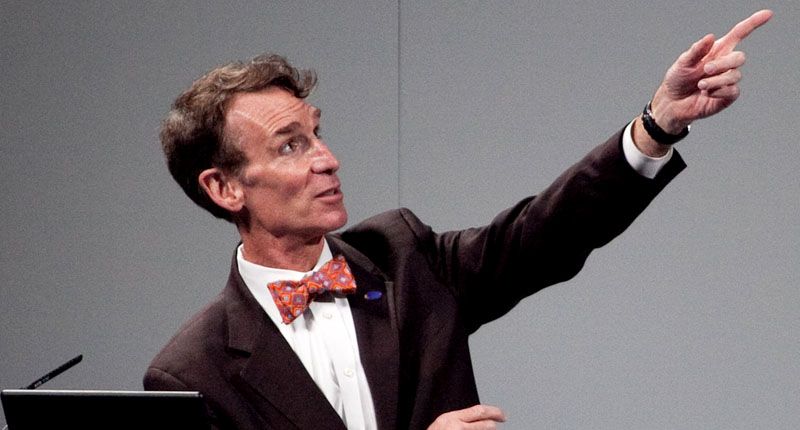On the latest episode of the Star Talk Radio Show, guest host Bill Nye "The Science Guy" discussed planet- and city-killing asteroids with co-host Eugene Mirman, comedian H. Jon Benjamin, NASA researcher Yvonne Pendleton, and Stanford astronautics professor G. Scott Hubbard.
"If the Earth gets hit by an asteroid, even a small one -- like the size of this stage -- it would be very troubling. Is that accurate?" Nye asked.
"If it hit this stage?" Hubbard replied, "we'd all be atoms."
"But how far would [the destruction] go?" Mirman asked.
"This entire section of San Francisco would be turned into atoms," Hubbard said. The extent of the destruction would depend on a number of factors. "If you had something that was about 50 feet -- that's the size of the thing that blew up in Chelyabinsk in Russia two years ago, and it blew up at 60,000 feet and damaged thousands of homes. About 1,100 people were hospitalized -- but nobody died."
"What happens if it hits the ground?" Benjamin asked. "It would have to be bigger to hit the ground?"
"Depends on what it's made of, the angle it comes in," Hubbard said. "Physics stuff. But if it had hit the ground, it would've been in the range of thousands of kilotons, a bit smaller than Hiroshima or Nagasaki."
"If you get just a little bigger," Nye asked, "like the size of a football field? Or five-eighths of a mile kind of size?"
"Then you're talking extinction event," Hubbard replied. "As in what happened to the dinosaurs. If you get down to the 100 meter range, you're talking about city killers. At 30 to 50 meters, you're talking about tsunamis. And there are nearly a million of these near-Earth objects."
"This sounds like science fiction," Nye replied. "But it's a real deal."
"Some people have speculated that the reason we haven't made contact with alien civilizations," he added, "is that you have to pass 'the asteroid test.' That if you don't have a space program, you accidentally let yourself get hit by a big rock and everybody dies."
Listen to the entire episode below via Soundcloud. The conversation about asteroids begins in earnest 21 minutes into it.
Leave a Comment
Related Post
